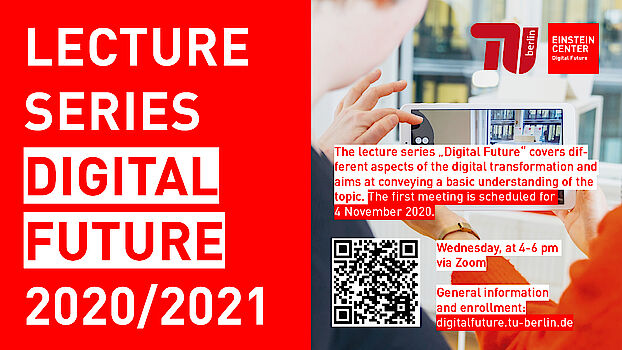"How to become a Data Scientist (in 3 steps)" is the title of the first lecture of the series of lectures "Digital Future" in the winter semester 2020/21 at the TU Berlin. It begins on November 4, 2020 at 16:00. The lecture series will take place online via zoom and is open to all students and the interested public (registration link see below). It is organized by ECDF Professor Florian Tschorsch.
The lecture series "Digital Future" covers different aspects of the digital transformation and aims at conveying a basic understanding of the topic. On a weekly basis, select speakers will present subjects from their research area, covering different facets of digitalization as well as different scientific disciplines. As such, the lecture series underlines the far-reaching significance of the digital transformation.
As in previous years, the lecture series puts an emphasis on a data-driven digital transformation. This year, professors from the Einstein Center Digital Future (ECDF) will staff the program and offer a sneak peek of their research. The lecture series explicitly addresses all students and the public. It thus contributes to an interdisciplinary education at TU Berlin and beyond. Students will acquire an overview of methods and applications in the area of data-driven digital transformation. This is the first step to become "data literate."
Participation:
In order to join the lecture series, you will need to enroll to the respective ISIS course. If you are unable to join the ISIS course (e.g. guests who don't have an account at TU Berlin), please use this form to request a guest enrolment key.
General Information:
As a lecture series, this module is organized as a sequence of weekly lectures by various lecturers from the ECDF, working for both, TU Berlin and other institutions.The lecture series takes place on Wednesday, at 4-6 pm. Due to the Corona pandemic, it will be held as an online course, using TU Berlin's Zoom instance. The first meeting is scheduled for 4 November 2020. The lecture series has a strong interdisciplinary focus and is thus open to all students. It may be especially beneficial to Bachelor students. Note that, while no formal background knowledge is required for participation, technological advances in the digital world constitute the core theme of the lecture series. You can earn credit points for your studies since this module can be included into your studies of free choice ("freier Wahlbereich"). The course is worth 3 LP. There will be an online assessment ("ePrüfung") at the end of the semester.
Schedule:
| Date | Topic | Speaker | Affiliation |
|---|---|---|---|
| 04.11.20 | How to become a Data Scientist (in 3 steps) | Timm Teubner | ECDF/TU |
| 11.11.20 | Make the Magic Box Transparent: Bias and Transparency in Machine Learning | Helena Mihaljević | ECDF/HTW |
| 18.11.20 | The Social Construction of Risk in Digital Preservation: A Qualitative Study of Trustworthy Digital Repository Audit Processes | Rebecca Frank | ECDF/HU |
| 25.11.20 | Information Privacy | Florian Tschorsch | ECDF/TU |
| 02.12.20 | Counter-Data as Counter-Culture | Michelle Christensen/Florian Conradi | ECDF/TU/UdK |
| 09.12.20 | Future of Work | Anastasia Danilov | ECDF/HU |
| 16.12.20 | Computer Supported Cooperative Work and Social Computing | Christian Meske | ECDF/FU |
| – lecture-free period – | |||
| 06.01.21 | Urban Energy Model based on CityGML | Rita Streblow | ECDF/TU/RWTH |
| 13.01.21 | Digitalization of Urban Water Systems | Andrea Cominola | ECDF/TU |
| 20.01.21 | SimRa | David Bermbach | ECDF/TU |
| 27.01.21 | Medical Data Science | Felix Balzer | ECDF/Charité |
| 03.02.21 | Digital Imaging for Virtual Treatment Planning | Tabea Flügge | ECDF/Charité |
| 10.02.21 | Digital Health | Tobias Schaeffter | ECDF/TU/PTB |
| 17.02.21 | Synthetic Data for Cardiovascular Research | Leonid Goubergrits | ECDF/Charité |

